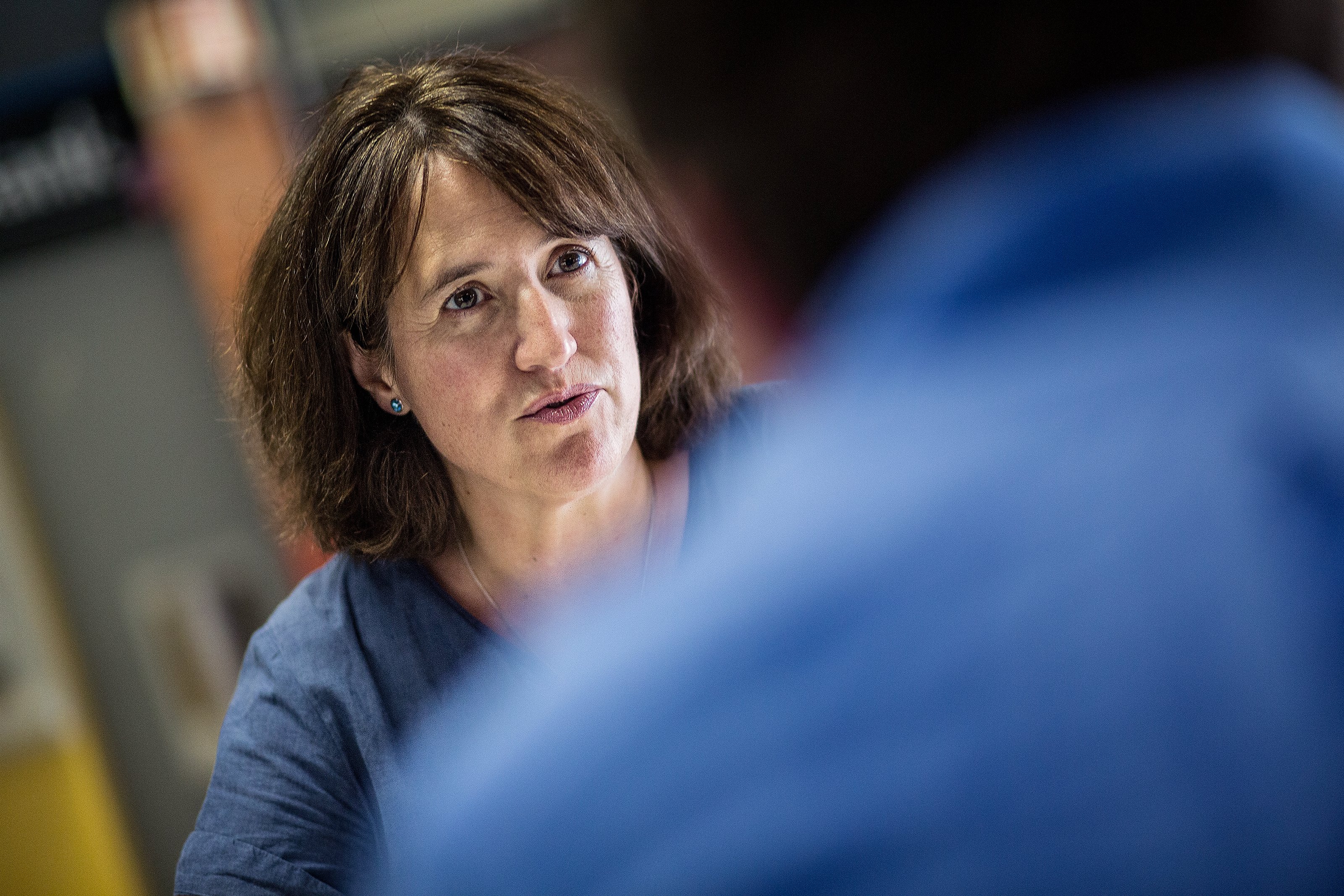Elisenda Paluzie (Barcelona, 1969) faces her first Diada - Catalan National Day, on 11th September - as president of the Catalan National Assembly (ANC). And she does so in an exceptional context: with the Catalan Republic having been proclaimed in October last year but its implementation suspended, and with the existence of political prisoners and exiles. It is for this reason that this year's mass Diada rally, co-organised by the ANC, is intended to send a wake-up call to the pro-independence political parties: that the current political repression must not cause the independence movement's political objective of the Republic to be abandoned. She also warns about the "trap" of Pedro Sánchez, which could be a version 2.0 of the "trick" played by the earlier Socialist prime minister, José Luis Rodríguez Zapatero. She doesn't place a great deal of hope in a negotiated approach to independence.
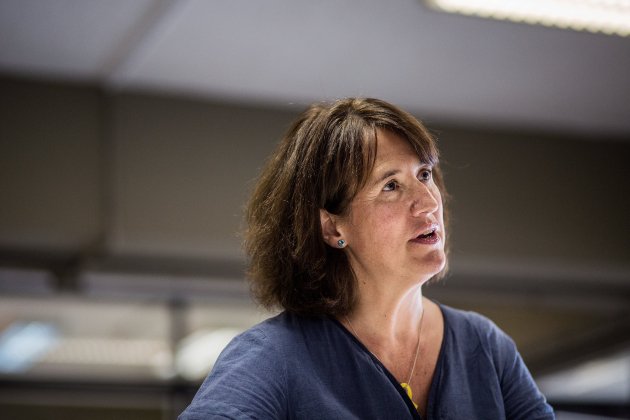
To fill Barcelona's Avinguda Diagonal from Palau Reial to Glòries is a difficult challenge...
Yes. All the 11th September marches have been difficult challenges, but all of them have also set the political agenda, they have influenced the milestones that we have achieved. It is a matter of communicating the message well: we need to put the political objectives back on the table, in particular that of putting the Catalan Republic into practice.
After everything that's happened, isn't there a risk of demobilization?
Society is highly mobilized. We are carrying out actions at different levels, although they are centred on giving support to the prisoners and the exiles. We'll have to see...
But there could be a certain amount of disappointment or frustration.
The events of last October are still not fully digested. They were very significant, but at the same time also traumatic. Something huge was achieved, which was to hold a self-determination referendum in the face of major police repression. But afterwards the result did not materialize. Afterwards repression, imprisonments, and exile arrived... All this we are still digesting. Society was left in a state of shock. It is now that people are starting to speak and to reflect, and critical reflections are appearing. If you don't attain an objective, the first thing you have to analyze is what has gone wrong. We have to convert this despondency into a new challenge, a new strategy.
Do you mean a kind of wake-up call?
Yes. In part, this is aimed at the pro-independence political parties: here we are, the people that defended the ballot boxes, voted for independence, and reaffirmed an independence majority in the December election.
Why have the prisoners been put to one side in the Diada demonstration?
It's not that they have been put to one side. Probably in the demonstration there will be elements that show this context. The metaphor of a mountain which we are using represents this very well. We have not yet reached the summit, but we are now at a higher base camp, and we have to keep on overcoming obstacles. And one of the obvious obstacles is the political repression. The Diada will reflect all this. But there is also a message: if there is one thing that can guarantee the liberation of the prisoners and the return of the exiles with absolute certainty it is the Catalan Republic. The two points are tied together.
Do you believe there are people who have given up the objective of the Republic to focus on the repression?
I wouldn't put it in that way, but it is clear that the existence of prisoners affects the debate greatly. However, that is precisely the objective of the political repression: to make you focus solely on the repression and forget your political goals. It is what we must not do...
But in a way, have they achieved it?
I don't believe so. I trust and hope that it is not so, and that when we again sit down at a table we will once again design a strategy to achieve our goal.
The objective of political repression is, precisely, to make you focus solely on that repression and forget your political goals.
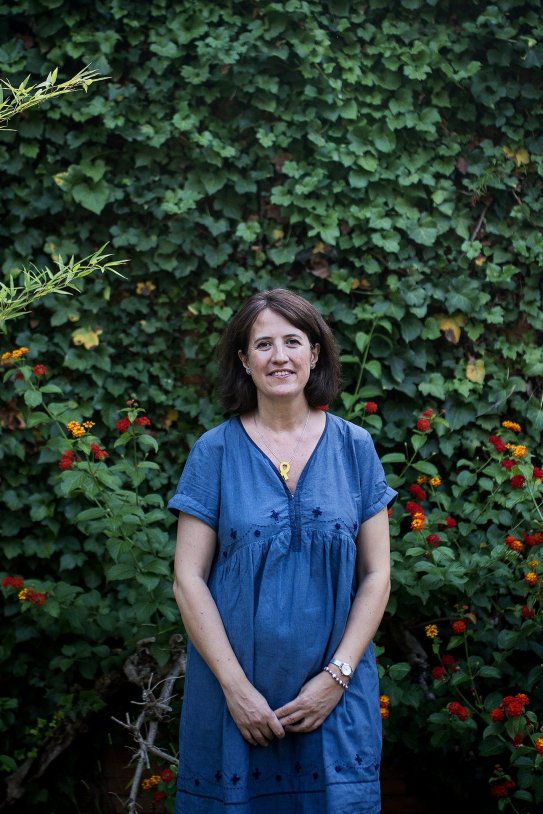
Are the pro-independence civil groups all in agreement?
They are very diverse. And there are new players, like the Committees for Defence of the Republic (CDR). Each one performs its function. When a time comes for us to all act together, we do so without problems. On the 16th of every month, the Òmnium Cultural group and ourselves, the ANC, organize a demonstration or activity to claim the freedom of the Jordis, Sànchez and Cuixart. We also did something similar for the transfer of the prisoners to Catalan prisons. Each group has its characteristics. The ANC came into being with only one objective: achieving independence. From its creation it influenced the political agenda in a proactive way. Òmnium is an entity with 60 years of history and with many other objectives.
But while Òmnium centres its discourse on the repression, and leaves the Republic aside, the ANC maintains the Republic as a priority.
You should, in any case, ask them about that. Against the repression, we work together. And on the 11th September they are taking part.
How is the Republic 'implemented'?
By creating it. In the end it is very simple and very difficult at the same time: it is by creating it, making it. The way so many countries around the world have won their independence. It is a question of having the strength, the democratic legitimacy and the determination, and imposing a new authority on the ground.
Accepting the possibility of a violent response?
We have already seen this on 1st October, but in a democratic Western European context, this violent response has its limits.
Is the change in the Spanish government an opportunity?
I don't think so. Sincerely, I believe that it could be a trap. A kind of marketing operation has started, saying that now we have a Spanish government that wants to talk, that transfers the prisoners to jails closer to home, that takes in refugees, that is not the conservative right of the Popular Party any longer... It could be a mere face-lift to calm down the intense aggressiveness of the PP government, but which deep down does not change anything.
The change in the Spanish government could be a trap. I believe that people will see through it a lot more quickly than with the 'trick' played by Zapatero.
Don't you trust the PSOE (Spanish Socialists) party?
We know who the PSOE are, what they have done throughout their history, including how their gave unconditional support to article 155 and the repression... Now they have just sent the motion approved by the Catalan Parliament to the Constitutional Court. I don't believe that it is an opportunity.
Not even a hundred days of grace?
It's what I anticipate. I believe that people will see through them a lot more quickly than with the trick played by Zapatero [on Catalonia's 2006 Statute of Autonomy]. It will happen faster.
What should president Torra say to Pedro Sánchez on Monday?
He should say what he has already said he will say: that Catalonia's right of self-determination has to be respected.
Would the ANC accept a referendum negotiated with the Spanish state?
Our understanding is that we held a self-determination referendum on 1st October last year. And that, as well as the binding referendum, there is a parliamentary majority again. Therefore, the Republic can be made effective as soon as circumstances allow it. But the mandate is there. We don't have to ask for it. But if there was an offer of holding a mutually-agreed referendum on independence, implying that the transition would be agreed to, then we would appraise it and accept it. It is easier to reach a negotiated independence than to carry it out without agreement. Even though the majority of countries that have become independent have done so without agreement.
Would you accept an agreement that did not contemplate such a referendum?
No, I wouldn't accept it. As a matter of fact, reaching an agreement that includes a referendum is already abandoning the mandate of 1st October to a certain extent. Below that minimum level we wouldn't accept it.
An agreement that includes a negotiated referendum is already abandoning the 1st October. That is the minimum and we wouldn't accept less than that in a pact.
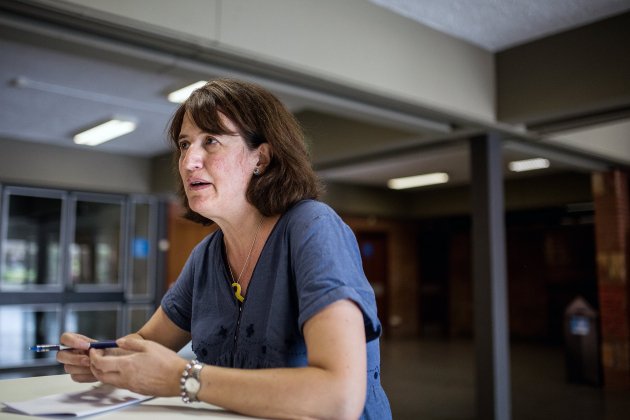
Do you agree with the statements made by minister Clara Ponsatí, who said that the Catalan government was "bluffing" in its moves last October?
Those statements have to be put in the context of the event where they were made. It was at an internal ANC England event, and I was there. She spoke after having heard comments that were quite critical and harsh from officials at the Catalan government's offices abroad about how things were managed, both after the 27th October [proclamation of independence] and before. In that context, it can be understood better.
Do you think that the Torra government is willing to implement the Republic?
There are contradictory signs. Sometimes there is the sensation that they are, and at other time you see elements that go in the opposite direction. They have to take a position, to fortify themselves and find a winning strategy and share it. For the present we are not at that stage, and I only see contradictory signs. We will have to sit down and talk.
Have there been any "exclusionary nationalisms" or "empty proclamations" in the independence movement, as Junqueras said in his controversial letter?
I don't know what he was referring to. Unless it's more specific, it's difficult to reply.
It seemed aimed at the Together for Catalonia (JxCat) group and president Torra.
Did it? The card didn't say so... It's difficult to think that it was like that. If he was talking about the writings of president Torra from years ago, then they are the writings and the person himself to whom Oriol Junqueras offered the possibility of becoming an independent deputy for Girona in the Spanish elections of 2011. Because of that it seems strange to me that he would be referring to Quim Torra.
Was it these partisan battles that created a problem for the implemention of the Republic?
I believe that there were things that were ready, and that a lot of progress had been made in areas like the creation of Catalonia's own taxation agency. In other areas, maybe not as much. But I don't believe that this was the determining factor. Rather, I believe that it was from an expectation of the Spanish state that turned out to be naïve, such as acting in a way aimed at forcing a negotiation or an international mediation. This was the error.
If the prisoners are here and we implement the Republic, then we have the keys to open the cells. The most effective way is, when you do it, do everything at the same time.
How do you interpret the transfer of the prisoners to Catalan prisons?
I interpret it as compliance with legal obligation. What I don't understand is why they were not in prisons close to their homes from the start, which is what the law establishes. The pretext that it was more comfortable for the investigating judge, when they have only gone to court two or three times in nine months...
During the protests outside the prisons last Wednesday, many demonstrators called on the Catalan government ministers and president, and to the speaker of Parliament, to unlock the cell doors. Do you believe that the Catalan government should take some action with the prisoners?
This reflection makes it very evident that [Catalan] independence is lacking and we have an institution totally subordinate to the Spanish state, just as our Autonomous Community status is. You have these competencies but you are subject to the control of the state. There is a deeper debate involved. The way to resolve it seems clear to me: if the prisoners are here and we implement the Republic, we have the keys to open the cells. The most effective way is, when you do it, you do everything at the same time.
A specific act of disobedience would not help.
Disobedience in stages is costly and can be counter-productive. It is a larger question: disobedience in stages or all together at the moment that you have the legitimacy, the strength and the determination. And you impose your authority on everything: on taxation, social security, the control of the territory and, obviously, if you have political prisoners, you free them.
So the doors can't yet be opened?
I don't say they can't be, but rather that I am sure that independence will open the doors and allow the return of the exiles. Opening them now, without implementing independence, would mean breaking the law and starting a new legal case.
Having the Barcelona mayoralty in pro-independence hands is important for when we have an opportunity again like last October.
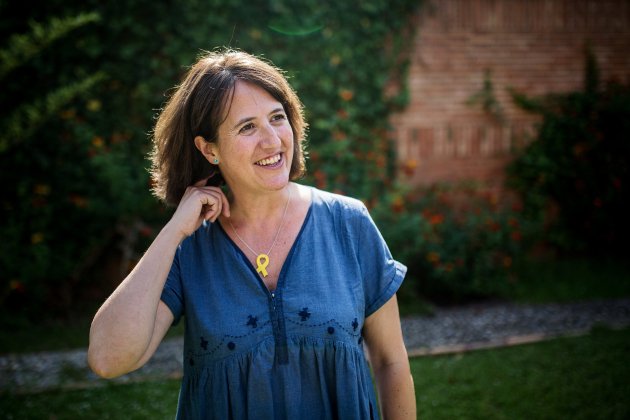
You fiercely defended the investiture of Puigdemont as Catalan president. Should his presidency be restored during this legislature?
Yes. I believe that it would give us momentum again, it would give us a push again.
What should Parliament do when judge Llarena advises of the suspension of the Catalan deputies charged with rebellion?
The alternative would be not to suspend them. They should be maintained in their roles.
Why are unitary pro-independence lists needed in the municipal elections, as the National Secretariat of the ANC has approved?
Months ago we had a lot of movement in some local ANC bodies on this, and in some places they voted to promote unitary candidatures, and in the majority of the cases, for candidatures chosen in primaries that were open to the public. It is a debate that has come from the bottom up. What the Secretariat aproved is a proposal that is specific but at the same time quite flexible. We support primary elections for pro-republican lists in the big cities, but exceptions are envisaged. In cities where a pro-independence mayor is already guaranteed, or where there are already alternatives to unionism, it wouldn't be necessary either.
For example?
I think of cities like Ripollet or Badalona, where alliances can be formed, with Podem and the Commons [left-wing parties non-aligned on independence]. That is a very general reflection, and in the end it will depend on specific towns. In any case, this proposal will have to be approved by [ANC] members in a vote.
The municipal elections might be like those of 1931. It is a matter of generating opportunities again.
How does it help to transfer the national debate and political blocs to municipal politics?
I don't see it so much as political blocs. In the case of Badalona, it would not be the politics of blocs...
But in the case of Barcelona it is being discussed in these terms.
That is the mayoralty of the capital of the country. And in October we saw that the powers-that-be exerted a lot of pressure against making a declaration of independence. And the mayor of Barcelona also did so. The international potential of the mayoralty of Barcelona is huge: the office has direct relationships with the mayors of Paris, New York or Rome. To have the Barcelona mayoralty in pro-independence hands is important for when we have an opportunity again as in October.
And because of that a unitary list is necessary?
In Barcelona, a specific circumstance applies: both in the municipal elections and in others, when you add all the pro-independence votes together, you easily have the most voted list. The current city government holds power with 11 out of 41 town councilors. Moreover, it could be a very good laboratory for civic participation and new styles of politics.
Do you look at the municipal elections of 2019 like those of 1931 [which led to a Catalan independence declaration and the creation of Spain's Second Republic]?
It could happen! It is a matter of generating opportunities again, and there could be many. It could be the verdict in the [referendum] trial, the municipal elections or something else... We have to play every hand that we can. We mustn't expect that an opportunity will be granted to us on a plate.

